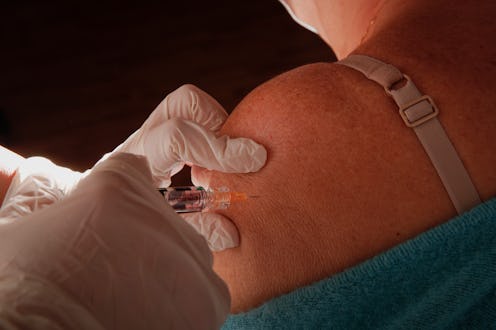Health
The COVID-19 Vaccines’ Side Effects, Explained
Spoiler alert: They’ll be familiar if you’ve gotten a flu shot before.

As COVID-19 vaccines come within tantalizing reach, you might be dreaming of the brunches and cocktail parties that await you post-jab. But there's been a lot of chatter about exactly what it might feel like to get the shots— and if you'll end up flattened by coronavirus vaccine side effects, unable to do anything except watch Netflix and moan. Tests from the current vaccine front-runners reviewed by independent committees show that actually, COVID-19 vaccine side effects will likely be pretty low-key.
"The trials that have been undertaken to get the vaccines to the approval stage have suggested minimal side effects, similar to the current flu vaccines," Dr. Robert Mordkin, M.D., chief medical officer at testing company LetsGetChecked, tells Bustle. "More specifics will be available once FDA emergency use authorization has been achieved, hopefully very soon."
The technical term for a vaccine that produces side effects is reactogenic: in other words, you react to it when it enters your system. In practice, that might you experience nausea, tiredness, mild fever, headaches, pain where you've been injected, headaches, and chills. If you've ever felt a little under the weather after getting a flu shot, this is the mechanism at play. The important thing to remember is that these side effects are temporary — in the vast majority of cases, they only last for a day or two — and also completely normal. Pfizer and Moderna have both said that their vaccines can spark mild to moderate side effects, which are thought to be tolerable. The vaccines appear to cause some severe side effects, defined as problems that prevent you from daily activity, but these are few and far between.
Science reports that if you got side effects after the first dose of your COVID-19 vaccine, you'll likely get them again after the second one, a little more intensely. And that's a good thing; it means your immune system is reacting strongly, and has learned from its first encounter with the virus, which translates to you developing antibodies, which keep you from getting sick.
Moncef Slaoui, Chief Scientific Adviser of Operation Warp Speed, told CNN in December that while 10 to 15% of people who get vaccinated will have "quite noticeable side effects," he thought it was worth it. "Most people will have much less noticeable side effects. That frankly — in comparison to a 95% protection against an infection that can be deadly or significantly debilitating — I think is an appropriate balance," he said.
When it's your turn to get the vaccine, talk to your doctor about possible side effects and how to manage them. Here's a comparison of the potential side effects of each COVID-19 vaccine.
Pfizer's COVID-19 Vaccine Side Effects
New Scientist explains that an independent data monitoring committee reported 4% of people in the Pfizer vaccine trials experienced fatigue, and 2% got headaches. Other people (fewer than 2%) experienced pain at the site of the injection, fevers, or general muscle pain. In other words, picture your flu vaccine or a bad hangover.
"We are asking people to take a vaccine that is going to hurt," Dr. William Schaffner M.D., a professor of preventive medicine and health policy at Vanderbilt University Medical Center, told NBC News in November. "There are lots of sore arms and substantial numbers of people who feel crummy, with headaches and muscle pain, for a day or two."
William Gruber, Pfizer’s senior vice president of vaccine clinical research and development, told STAT News in November that the side effects of their COVID-19 vaccines will be comparable to standard adult vaccines, but likely worse than the pneumonia vaccine or a flu shot.
Moderna's COVID-19 Vaccine Side Effects
According to Science, independent monitoring of Moderna's trial results found that 9.7% of participants experienced fatigue, 8.9% felt muscle pain, 5.2% felt joint pain, and 4.5% got headaches, each severely, though the vaccine was "generally well tolerated." Under 2% got severe fevers of 39°C to 40°C (102°F to 104°F). Moderna's full trial data hasn't been released, but the company said in a press release that these events were "generally short-lived."
If you're feeling really grim after your COVID-19 vaccine, keep an eye on your symptoms and talk to your doctor about any concerns.
Expert:
Dr. Robert Mordkin M.D.
Studies cited:
Folegatti, P. M., Ewer, K. J., Aley, P. K., Angus, B., Becker, S., Belij-Rammerstorfer, S., Bellamy, D., Bibi, S., Bittaye, M., Clutterbuck, E. A., Dold, C., Faust, S. N., Finn, A., Flaxman, A. L., Hallis, B., Heath, P., Jenkin, D., Lazarus, R., Makinson, R., Minassian, A. M., … Oxford COVID Vaccine Trial Group (2020). Safety and immunogenicity of the ChAdOx1 nCoV-19 vaccine against SARS-CoV-2: a preliminary report of a phase 1/2, single-blind, randomised controlled trial. Lancet (London, England), 396(10249), 467–478. https://doi.org/10.1016/S0140-6736(20)31604-4
Widge, A. T., Rouphael, N. G., Jackson, L. A., Anderson, E. J., Roberts, P. C., Makhene, M., Chappell, J. D., Denison, M. R., Stevens, L. J., Pruijssers, A. J., McDermott, A. B., Flach, B., Lin, B. C., Doria-Rose, N. A., O'Dell, S., Schmidt, S. D., Neuzil, K. M., Bennett, H., Leav, B., Makowski, M., … mRNA-1273 Study Group (2020). Durability of Responses after SARS-CoV-2 mRNA-1273 Vaccination. The New England journal of medicine, 10.1056/NEJMc2032195. Advance online publication. https://doi.org/10.1056/NEJMc2032195